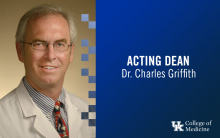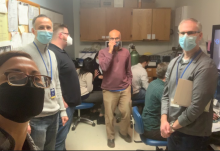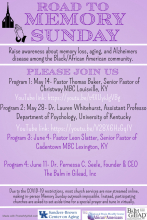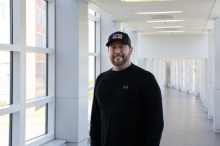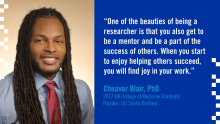Griffith Named Acting Dean for UK College of Medicine
University of Kentucky Provost David Blackwell has announced Dr. Charles “Chipper” Griffith III has been named the acting dean of the UK College of Medicine, effective July 1, 2021.
Griffith will serve as acting dean while Dean Bob DiPaola serves as acting provost, from July 1, 2021, to June 30, 2022. At that time, DiPaola intends to return to the College of Medicine and Griffith will return to his current roles.
UK’s Sanders-Brown Researchers Discover Polyamines Prevent Collection of Alzheimer’s Disease Protein
A study by several researchers at the University of Kentucky’s Sanders-Brown Center on Aging (SBCoA) was recently highlighted in AlzForum. The study focuses on polyamines, the nitrogen-packed aliphatic molecules produced by our own cells and found in the foods we eat. They have been described by some as anti-aging generators.
FINDERS: An Alliance of Clinicians, Scientists to Treat Epileptic Seizures
Meriem Bensalem-Owen, MD, and Brian Gold, PhD, might not have ever had the chance to work on projects together. Dr. Bensalem-Owen is a physician who spends much of her time at the patients’ bedside, reviewing video-EEG monitoring studies, or in clinic treating patients with epilepsy, and Dr. Gold is a researcher who studies age-related brain and cognitive changes in the lab.
But thanks to the University of Kentucky College of Medicine’s Alliance Research Initiative, they have joined forces to better localize, and ultimately treat, epileptic seizures.
Dr. Michael Piascik to Retire after 40 Years with College of Medicine
In his 40 years at the University of Kentucky College of Medicine, Michael T. Piascik, PhD, has mentored hundreds of medical students and graduate students while bringing key funding to the college as a researcher to help produce groundbreaking discoveries in pharmacology.
After a long and distinguished career, Dr. Piascik has announced he will retire, effective July 1.
Publications for the month of May 2021
The Department had twelve publications listed in PubMed for the month of May 2021.
1: Zhang Z, Cheng L, Zhang Q, Kong Y, He D, Li K, Rea M, Wang J, Wang R, Liu J, Li Z, Yuan C, Liu E, Fondufe-Mittendorf YN, Li L, Wang C, Liu X, Han T. Co-Targeting Plk1 and DNMT3a in Advanced Prostate Cancer. Adv Sci (Weinh). 2021 May 29:e2101458. doi: 10.1002/advs.202101458. Epub ahead of print. PMID: 34051063.
New UK Research May Offer Hope for Alzheimer’s Patients
LEXINGTON, Ky. (June 4, 2021) — University of Kentucky Department of Neuroscience Professor Greg Gerhardt, Ph.D., hypothesizes that the balance of glutamate and gamma-aminobutyric acid (GABA) — two main neurotransmitters in the brain — contributes to Alzheimer’s disease and age-related declines in cognition and memory.
Memory Sunday: The Road to Memory Sunday - June 13, 2021
UKnow: When COVID-19 Took His Breath, a Double Lung Transplant Gave it Back
By Hilary Brown
(Click here to visit UKnow)
It seemed like nothing at first. Dave Hoover thought he had a sinus infection.
CHET Awards Two Pilot Grants
Congratulations to Shuoli Zhao, PhD, Assistant Professor of Agricultural Economics in the College of Agriculture, Food, and Environment, and Courtney T. Luecking, PhD, MPH, RDN Assistant Professor and Extension Specialist in Health and Nutrition in the Department of Dietetics and Human Nutrition who received 2021 CHET Pilot Awards.
